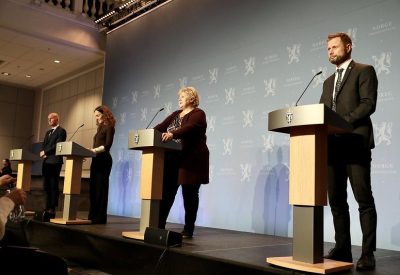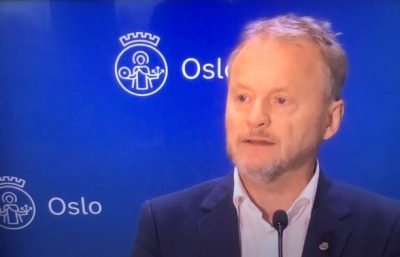The Norwegian government will no longer exempt foreign workers from quarantine regulations when they arrive in Norway from so-called “red” countries with high infection rates. They won’t be allowed to work until 10 days of quarantine are over.

The new rule is aimed at better monitoring people arriving from countries with infection rates of more than 150 Corona cases per 100,000 residents during the past 14 days. It was announced by Prime Minister Erna Solberg at another government press conference on Monday that followed up on concerns she raised heading into the weekend, after a jump in Corona infection cases in Norway.
It will especially affect workers from Poland and other people arriving from countries including France, Spain and Great Britain that also have such high infection rates. The end of the current quarantine exemption for workers will take effect from midnight Friday, and comes after at least 50 people arriving from Poland last week were confirmed as infected.
“There’s been a lot of infection spreading both in Poland and other parts of Europe,” Dr Ole Henrik Augestad, chief medical officer the region served by the Torp Airport in Sandefjord, told Norwegian Broadcasting (NRK) earlier on Monday. “We’re seeing the effects of that in Norway now.”
10 days in a single room
Norway’s public health institute FHI had recommended that workers commuting from areas of Europe with high infection rates should no longer be exempted from quarantine rules while at work. The government listened, and also imposed restrictions on those only subject to quarantine during their free time. It will take effect from midnight Tuesday, and demands that newly arrived workers must be housed in single rooms and be tested every third day during the first 10 days of their arrival in Norway.
Employers must also make arrangements that can ensure social distancing throughout the entire quarantine periods, also in public areas of company barracks, for example, like kitchens and living rooms. It means extra expense for businesses, some of which are already hard-pressed, and national employers’ organization NHO raised objections. Solberg noted that some companies will qualify for compensation of specific Corona-related costs or losses.

The leader of Oslo’s city government, Raymond Johansen of the Labour Party, has been one of the strongest advocates of better controlling infection levels among foreign workers arriving in Norway. He was relieved that state officials were addressing the issue, over the protests of NHO.
“There are several planes landing every day in Oslo from Poland, a country with high infection rates,” Johansen said while also unveiling tougher restrictions for the general population in the Norwegian capital. “We want everyone to be tested several times, both upon and after arrival.”
He had told newspaper Aftenposten over the weekend that Norway should even consider “blocking arrivals from countries with lots of infection, and close our borders” if infection levels don’t decline. He lashed out at the controversial low-fare airline Wizz Air, claiming it bears special responsibility since it flies in the most foreign workers to Norway.
“I know that what I’m saying can have great consequences for business in Norway and for the daily lives of many,” Johansen said. “But the consequences will be even greater if we don’t manage to do anything. If we continue to let many people in, we must question the wisdom of that.”
Trying to avoid a new shutdown
Johansen also said he realized that many companies in Norway rely on foreign labour, but if Corona infection isn’t under better control, “we can land in a situation where we’ll have to shut down the country again.” He thinks it’s better to usher in stricter rules for a period now, then to wait until Europe shuts down even more than it has now.
Johansen also wants to consider the option of mandatory testing on arrival at Norwegian airports, not just the voluntary testing available now. He was relieved that quarantine rules will be better enforced and that workers living in company barracks will have single rooms. Companies need to follow standard rules, said Johansen, who also has said that no one, including Norwegians returning from abroad, should be allowed to go directly to work right after arrival in Norway.
Solberg’s government also followed through on stricter national measures that can be made even stricter by authorities at the local level if deemed necessary. Her government recommends that no more than five guests should be invited into private homes, gardens or holiday homes (hytter) at a time. Children attending the same day care center or elementary school, however, are exempted.
“We also recommend meeting fewer people in social situations in the course of a week,” Solberg said. In Oslo, Johansen and his government have put a limit on meeting 10 people a week. Private parties like weddings in rented locations should have a maximum of 50 participants, Solberg said, and the government will support local authorities who see a need to tighten rules for public events, at restaurants and bars or at work. Everyone continues to be encouraged to work from home if at all possible.
NewsInEnglish.no/Nina Berglund

